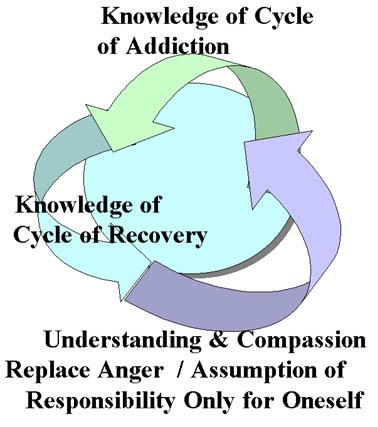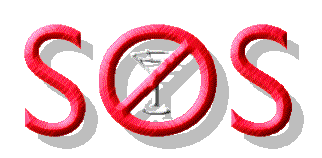|
|

The Cycle of Addiction: In all cases, the addiction becomes “priority one,” a separate issue from all else. As it progresses, it begins to negate everything else. |
| The Cycle of Sobriety: This cycle remains in place only as long as the addicted individual cognitively chooses to acknowledge the existence of his or her addiction. |

The Family and Friends Recovery Cycle: Knowledge of addiction and sobriety cycles can free family members and friends of the chemically dependent loved one to rightfully assume responsibility for their own lives only. |
General Principles of SOS
- All those who want to gain understanding of their feelings about their relationships with an addicted person are welcome.
- SOS is not a spin-off of any religious or secular group. SOS is concerned with aiding family and friends in developing understanding and compassion for the addicted person.
- Although sobriety is an individual responsibility the acceptance and help from others in close contact is a vital adjunct to recovery.
- In SOS, family and friends gain insight into the workings of other recovering persons as members share experiences, information, strength, and encouragement in friendly, honest, and supportive group meetings.
- Honest, clear, and direct communication of feelings, thoughts, and knowledge aids in recovery. Support in choosing non-destructive, non-delusional, and rational approaches to living sober, rewarding lives, aids in developing new and better relationships.
- SOS guards the anonymity of all who attend meetings, and the contents of its discussions, from those not within the group.
- SOS encourages the scientific study of all aspects of alcoholism and addiction. SOS does not limit its outlook to one area of knowledge or theory of alcoholism and addiction.
The SOS Groups
SOS is a nonprofit network of autonomous, nonprofessional local
groups in the USA and many
European countries dedicated solely to helping
individuals achieve and maintain sobriety. There are groups
meeting in many cities throughout the country. For information
about a group in your area, or if you would like to start a
group, contact:
SOS
Clearinghouse
(Save Our Selves)
4773 Hollywood Blvd,
Hollywood, CA 90027 USA.
Tel : (323) 666-4295 Fax: (310) 821-2610
See also...
|
|

